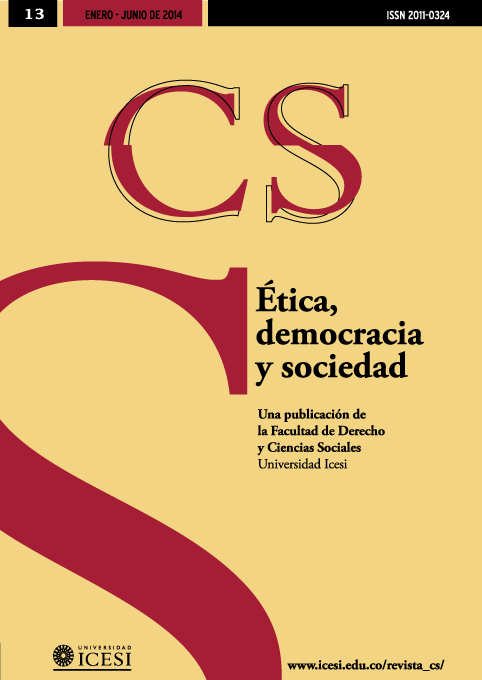Dialogue and Inclusion: A Moral Decision
DOI:
https://doi.org/10.18046/recs.i13.1822Keywords:
Dialogue, inclusion, moral, the peace processAbstract
This article presents some of the characteristic features which, in the context of deliberative politics, can be highlighted within the inclusive function of dialogue as suggested by authors such as Jürgen Habermas and Richard Rorty. In addition to reviewing the ideas of these authors, it will demonstrate that the process of inclusion cannot be achieved simply through dialogue, but that a conscious decision must be made that leads to a broadening of moral and conversational limitations in order to make inclusion possible. This type of decision is exemplified by the peace talks between the Colombian government and the guerrillas of the FARC in Havana, Cuba.
Downloads
References
Bernstein, R (2003). Rorty's Inspirational Liberalism. En Guignon, C. & Hiley, D. (Ed.). Richard Rorty. Contemporary Philosophy in Focus. (pp. 124–138 New York, E.E.U.U.: Cambridge University Press.
Brandom, R (2000). Facts, norms and normative facts: a response to Habermas. European Journal of Philosophy 8 (3), (pp. 356–374).
Brandom, R (2000b). Rorty and his Critics. Massachusetts, E.E.U.U.: Blackwell
Guignon, C. & Hiley, D (2003). Richard Rorty. Contemporary Philosophy in Focus. New York, E.E.U.U.: Cambridge University Press.
Habermas, J (1993). El discurso filosófico de la modernidad. Manuel Jiménez Redondo (Tr.). Madrid, España: Taurus.
Habermas, J (1996). Teoría de la acción comunicativa: complementos y estudios previos. Manuel Jiménez Redondo (Tr.). México, México: REI.
Habermas, J (1999). Teoría de la acción comunicativa, I. Manuel Jiménez Redondo (Tr.). Madrid, España: Taurus.
Habermas, J (2002). Verdad y justificación. Pere Fabra y Luis Díez (Tr.). Madrid, España: Trotta.
Habermas, J (2004). La ética del discurso y la cuestión de la verdad. Ramón Vilà Vernis (Tr.). Buenos Aires, Argentina: Paidós.
Habermas, J (2006). Entre naturalismo y religión. Pere Fabra (Tr.). Barcelona, España: Paidós.
Rorty, R. (1980). Philosophy and the Mirror of Nature. New Jersey, E.E.U.U.: Princeton University Press.
Rorty, R (1980). 'Pragmatism, Relativism, and Irrationalism'. En: Proceedings and Addresses of the American Philosophical Association, Vol 53, No. 6, (pp. 717+719–738).
Rorty, R (1990) Truth and Freedom: a Reply to Thomas McCarthy. Critical Inquiry, Vol. 16 (3), pp. 633–643.
Rorty, R (1995). Contingency, Irony, and Solidarity. New York, E.E.U.U.: Cambridge University Press.
Rorty, R (1996). Objetividad, relativismo y verdad. Jorge Vigil Rubio (Tr.). Barcelona, España: Paidós.
Rorty, R (1999). Truth and Progress. New York, E.E.U.U.: Cambridge University Press.
Rorty, R (2000). El pragmatismo, una versión. Antiautoritarismo en epistemología y ética. Joan Vergés Gifra (Tr.). Barcelona, España: Ariel.
Wellmer, A. (1994). Ética y diálogo: elementos del juicio moral en kant y en la ética del discurso. Fabio Morales (Tr.). Barcelona, España: Anthropos.
Williams, B. (2006). Verdad y veracidad. Alberto Enrique Álvarez y Rocío Orsi (Trs.). Barcelona, España: Tusquets editores.
Downloads
Published
Issue
Section
License
Copyright (c) 2014 Hernán Medina Botero

This work is licensed under a Creative Commons Attribution-NonCommercial 4.0 International License.
© Reserved Copyright
Material in this publication may be reproduced without authorization, provided the title, author and institutional source is acknowledged.
The content published in Revista CS is distributed under the Creative Commons BY-NC 4.0 Attribution/Recognition-NonCommercial 4.0 International license.
You are free to:
Share — copy and redistribute the material in any medium or format.
Adapt — remix, transform, and build upon the material.
Under the following terms:
Attribution — You must give appropriate credit , provide a link to the license, and indicate if changes were made . You may do so in any reasonable manner, but not in any way that suggests the licensor endorses you or your use.
NonCommercial — You may not use the material for commercial purposes.












